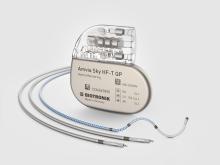First BIO-LIBRA Results Pave Way for More Representative Clinical Trials
After starting enrollment in 2019, Dr. Valentina Kutyifa announced the first results of the BIOTRONIK-supported BIO-LIBRA trial at the Annual Heart Rhythm Society meeting (HRS 2022).

In a field where women are underrepresented in past cardiovascular disease clinical studies, 47 percent of patients enrolled in the BIO-LIBRA trial were women. That helped Dr. Kutyifa and co-investigator Dr. Jeanne Poole achieve their main study goal—determine what differences, if any, could be found between men and women when it comes to device therapy response. They found that women had a lower probability of ventricular tachyarrhythmias or mortality than men did. So, what do the study results mean for cardiovascular research?

Focusing on ways to better represent women enabled us to enroll a more diverse population that is more representative of the patients we are serving in everyday clinical practice.
Gender-Balance in Clinical Studies Leads to More Informed Treatment Decisions
Although previous studies have found that women with CRT-Ds tend to have lower hospitalization and death rates than men undergoing device therapy, BIO-LIBRA’s results are the first to demonstrate this in an almost completely gender-balanced study population. The De Waard et al post-hoc analysis of the RAFT trial had similar findings, but the authors themselves argued that with women making up only 17 percent of patients studied, the data was potentially underpowered.
With enrollment having finished in October 2021, BIO-LIBRA follows 1,000 patients. The first results account for the first half and additional results will be released as follow-up continues. Another similar BIOTRONIK-supported study—BIOWOMEN—has enrolled 494 people with de novo indications for CRT implantation, from 27 sites across seven European countries and Israel. The study aimed to enroll as close to a 50-50 split as possible and ended with 48% women. All patients will be followed for 12 months to see if there is a difference in CRT response between women and men. Future representative studies like BIOWOMEN will add to the number of balanced studies, allowing cardiologists to make more clinically informed treatment decisions for women.
BIO-LIBRA will continue following 1000 men and women for up to three years, with study status updates available here.




















